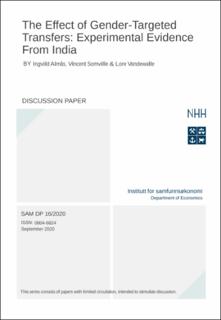| dc.contributor.author | Almås, Ingvild | |
| dc.contributor.author | Somville, Vincent | |
| dc.contributor.author | Vanderwalle, Lore | |
| dc.date.accessioned | 2020-09-04T08:09:01Z | |
| dc.date.available | 2020-09-04T08:09:01Z | |
| dc.date.issued | 2020-09 | |
| dc.identifier.issn | 0804-6824 | |
| dc.identifier.uri | https://hdl.handle.net/11250/2676341 | |
| dc.description.abstract | Women are the primary recipients of many welfare programs around the world. Despite frequent claims that targeting women induces beneficial consumption shifting and gender equality, the empirical evidence on the effect of targeting is relatively scarce. We report on a highly powered intervention that randomly allocates weekly transfers to a man or woman within the household. We use detailed financial diaries to look at the impact of the recipient's gender on expenditure, income, saving, nutrition and measures of decision-making. Our results show little evidence for consumption shifting at the household level but indicate that targeted transfers empower female recipients. | en_US |
| dc.language.iso | eng | en_US |
| dc.relation.ispartofseries | DP SAM;16/2020 | |
| dc.subject | Households, Consumption, Development, Gender Inequality | en_US |
| dc.title | The Effect of Gender-Targeted Transfers: Experimental Evidence From India | en_US |
| dc.type | Working paper | en_US |
| dc.subject.nsi | Samfunnsvitenskap | en_US |
| dc.source.pagenumber | 31 | en_US |
| dc.relation.project | 262675 | en_US |
